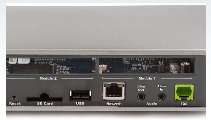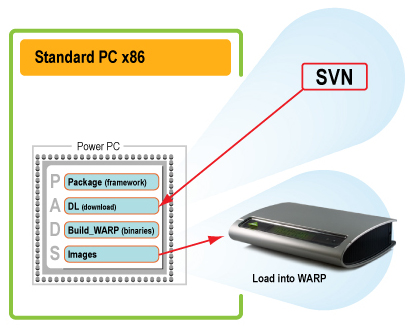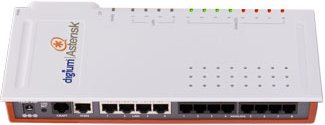PowerPC VoIP appliance comes with Linux cross-tools
Jun 6, 2008 — by Eric Brown — from the LinuxDevices Archive — 9 views Pika Technologies is shipping an IP-PBX appliance with a cross-compiling SDK (software development kit) based on Denx Linux and the open source Asterisk PBX software stack. “Pika Warp, the Appliance for Linux” supports 32 simultaneous calls, and provides music-on-hold and power failure transfer, the… vendor claims.
Pika Technologies is shipping an IP-PBX appliance with a cross-compiling SDK (software development kit) based on Denx Linux and the open source Asterisk PBX software stack. “Pika Warp, the Appliance for Linux” supports 32 simultaneous calls, and provides music-on-hold and power failure transfer, the… vendor claims.
(Click for larger view of Pike Warp Appliance for Linux)
Announced last Fall, the Appliance for Linux is now shipping. Pika says developers can use the platform to create low-power, low-cost solutions for small businesses. Compared to PC-based, “data centric” competitors, the Appliance covers more of the traditional features users expect, Pika says, citing music-on-hold (MOH) and failover to analog operation (via RJ-11 ports build into the optional FXS modules) in case of power failure. Other touted features include integrated voice response (IVR), predictive dialing, appointment reminders, and paging, says the company.
 Pika Warp Appliance for Linux (partial rear view) |
The compact, 9.3 x 6.7 x 2.2-inch device is equipped with a 533MHz AMCC Power PC 440EP, a security-enhanced version of the PowerPC 440. It comes standard with 256MB of RAM, 4MB NOR flash, 256MB of NAND flash, expandable via an SD card slot. I/O includes Ethernet and USB.
Telephony interfaces include:
- Standard station ports — 1 FXS (adapts standard analog telephones)
- Expansion modules — 2
- Expansion module types
- 4 FXS/ station (+PFT)
- 4 FXO/ trunk (+PFT)
- 4 port/ 8 channel BRI
Additional touted features and specs include:
- Display — 2 x 20 backlit LCD display, with API-controlled front-panel scroll button
- Dynamic thermal management
- RS232 programming port
- Wall mountable design
- Dimensions — 9.3 x 6.7 x 2.2 inches (234 x 169 x 55 mm)
- Power — AC 110V-240V (50-60 Hz) input voltage; 25 W maximum input
- Operating temperature — 0 to 104 degrees F (0 to 40 degrees C)
- Operating system — Denx ELDK, with a 2.6.19.2 Linux kernel
The PADS development environment
The Appliance's Linux implementation was built atop Denx's Embedded Linux Development Kit (ELDK). The system ships with a “Pika Application Development Suite” (PADS), described as a host media processing (HMP) software framework that enables developers to create telecom applications, including IVR, voicemail, custom PBX systems, and gateways. PADS reported includes Pika voice processing applications for tone detection and generation, play/record, VoIP, echo cancellation, and conferencing. The framework also includes a cross-compiling toolchain, linker, and debugger, as depicted below.

PADS development diagram
PADS also ships with Pika's MonteCarlo SDK (software development kit), which includes the Denx ELDK distribution, drivers, and related tools. The MonteCarlo SDK offers a choice between low- (HMP) and high-level (GrandPrix) C-based APIs. The PADS package includes SSH access and Asterisk, along with a database, web server, web language, and other tools.
 Digium's Asterisk Appliance (Click for details) |
Competitors in the open-source IP/PBX telephony market include 4S Newcom's Mac-based Blue4S and Digium's Asterisk Appliance (shown at right). Digium was founded by Asterisk originator Mark Spencer. Packt Publishing recently published a book on Asterisk by Nir Simionovich called AsteriskNOW, and has provided a sample chapter for download.
Stated Terry Atwood, Pika's VP of sales, “The one thing that sets Pika's Appliance apart is PADS. Through PADS, Asterisk and Linux developers are able to easily take the unique, value added features and applications they have developed, modify them for the appliance embedded environment, and compile a complete package to load on the box.”
Availability
The Pika Warp Appliance for Linux is shipping now at a price between $600 and $1,500, depending on configuration and volume, says Ottawa, Canada-based Pika Technologies. More information on the appliance may be found here.
This article was originally published on LinuxDevices.com and has been donated to the open source community by QuinStreet Inc. Please visit LinuxToday.com for up-to-date news and articles about Linux and open source.